 This series continues the investigations that singularise Chagas’ work, namely the attention to the experiential and affective relationships that subjects establish with everyday objects and spaces, countering fast rhythms of consumption through a decelerated gaze that closely scrutinises discarded materials, shapes and textures. However, the series simultaneously marks a kind of turning point, insofar as, unlike previous series carried out in various urban public spaces to the North and South, vaguely identified (the streets and beaches of Luanda, Venice, London and Newport, etc.), in this series, for the first time, the photographer focused on the indoors and outdoors of a specific architecture.
This series continues the investigations that singularise Chagas’ work, namely the attention to the experiential and affective relationships that subjects establish with everyday objects and spaces, countering fast rhythms of consumption through a decelerated gaze that closely scrutinises discarded materials, shapes and textures. However, the series simultaneously marks a kind of turning point, insofar as, unlike previous series carried out in various urban public spaces to the North and South, vaguely identified (the streets and beaches of Luanda, Venice, London and Newport, etc.), in this series, for the first time, the photographer focused on the indoors and outdoors of a specific architecture.
I'll visit
29.09.2022 | by Ana Balona de Oliveira
 For PARLA_MUTE his latest show at Michael Janssen Gallery in Berlin, Yonamine presents a series of posters and silkscreens made from a number of phrases and graphic material picked up, once more, from the streets and transformed incessantly through the remix. We should prepare ourselves, once more, for a poignant show filled with seemingly contradictory messages—“It’s expensive to be poor” resonates strongly, or think about the title if one reads it on a bilingual horizon—in which the incessant variations of a handful of themes take centerstage, as they unfold and unfold infinitely.
For PARLA_MUTE his latest show at Michael Janssen Gallery in Berlin, Yonamine presents a series of posters and silkscreens made from a number of phrases and graphic material picked up, once more, from the streets and transformed incessantly through the remix. We should prepare ourselves, once more, for a poignant show filled with seemingly contradictory messages—“It’s expensive to be poor” resonates strongly, or think about the title if one reads it on a bilingual horizon—in which the incessant variations of a handful of themes take centerstage, as they unfold and unfold infinitely.
I'll visit
02.09.2022 | by Yonamine and José Luis Falconi
 I believe that through art we can find a strong path of remembrance. Artists are able to communicate across temporalities and spaces, which traditional historiographical treatment could hardly accomplish. Artists who work with individual and personal history build empathy through works compared to academic research. Colonial monuments and street names left un-vandalized are not neutral spaces. As static as stone and tarmac may seem, memory is a process, not something carved and eternally preserved. New practices of memory preservation, from manifold perspectives, allow for addressing misconceptions and novel understandings of where certain contemporary situations emerge. In the absence of these practices, our imaginary becomes an accomplice to denials of violent that can always be repeated in unexpected ways.
I believe that through art we can find a strong path of remembrance. Artists are able to communicate across temporalities and spaces, which traditional historiographical treatment could hardly accomplish. Artists who work with individual and personal history build empathy through works compared to academic research. Colonial monuments and street names left un-vandalized are not neutral spaces. As static as stone and tarmac may seem, memory is a process, not something carved and eternally preserved. New practices of memory preservation, from manifold perspectives, allow for addressing misconceptions and novel understandings of where certain contemporary situations emerge. In the absence of these practices, our imaginary becomes an accomplice to denials of violent that can always be repeated in unexpected ways.
To read
27.08.2022 | by Marta Lança
 Institutionalized violence shapes who people are—victims and perpetrators alike—to an extent that only the recovery of the condition of plurality can undo it. This points to the most basic right immanent to the human condition, which imperialism constantly compromises: the right not to act against others; in its positive formulation: the right to act alongside and with one another. “Accepting this right in its two forms as fundamental is necessary in order to imagine reparations, so the bliss of being active and repairing what was broken can be attained.
Institutionalized violence shapes who people are—victims and perpetrators alike—to an extent that only the recovery of the condition of plurality can undo it. This points to the most basic right immanent to the human condition, which imperialism constantly compromises: the right not to act against others; in its positive formulation: the right to act alongside and with one another. “Accepting this right in its two forms as fundamental is necessary in order to imagine reparations, so the bliss of being active and repairing what was broken can be attained.
Mukanda
11.08.2022 | by Ariella Aisha Azoulay
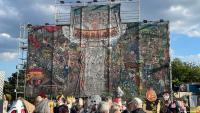 As agitprop, People’s Justice isn’t complex. On the right are the simple citizens, villagers and workers: victims of the regime. On the left are the accused perpetrators and their international accomplices. Representatives of foreign intelligence services – the Australian ASIO, MI5, the CIA – are depicted as dogs, pigs, skeletons and rats. There is even a figure labelled ‘007’. An armed column marches over a pile of skulls, a mass grave. Among the perpetrators is a pig-faced soldier wearing a Star of David and a helmet with ‘Mossad’ written on it. In the background stands a man with sidelocks, a crooked nose, bloodshot eyes and fangs for teeth. He is dressed in a suit, chewing on a cigar and wearing a hat marked ‘SS’: an Orthodox Jew, represented as a rich banker, on trial for war crimes – in Germany, in 2022.
As agitprop, People’s Justice isn’t complex. On the right are the simple citizens, villagers and workers: victims of the regime. On the left are the accused perpetrators and their international accomplices. Representatives of foreign intelligence services – the Australian ASIO, MI5, the CIA – are depicted as dogs, pigs, skeletons and rats. There is even a figure labelled ‘007’. An armed column marches over a pile of skulls, a mass grave. Among the perpetrators is a pig-faced soldier wearing a Star of David and a helmet with ‘Mossad’ written on it. In the background stands a man with sidelocks, a crooked nose, bloodshot eyes and fangs for teeth. He is dressed in a suit, chewing on a cigar and wearing a hat marked ‘SS’: an Orthodox Jew, represented as a rich banker, on trial for war crimes – in Germany, in 2022.
To read
10.08.2022 | by Eyal Weizman
 In January 2022, Xiomara Castro became Honduras’s first woman president, restoring electoral democracy to the country after more than a decade of dictatorship. Running with the leftist Liberty and Refoundation (LIBRE) party, Castro’s election breaks with the century-old two-party system that traded power between elites in the establishment National and Liberal parties. With a mandate for transformation and high popular expectations, Castro faces significant challenges in a context of profound systemic crisis.
In January 2022, Xiomara Castro became Honduras’s first woman president, restoring electoral democracy to the country after more than a decade of dictatorship. Running with the leftist Liberty and Refoundation (LIBRE) party, Castro’s election breaks with the century-old two-party system that traded power between elites in the establishment National and Liberal parties. With a mandate for transformation and high popular expectations, Castro faces significant challenges in a context of profound systemic crisis.
Games Without Borders
25.07.2022 | by Hilary Goodfriend
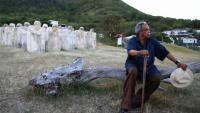 The focus of the Paris conference was on Glissant’s key concepts of relation, opacity, creolization, and disaffiliation. The Martinique-born writer and thinker was, of course, the first philosopher of post-filiation, by which I refer not only to his rebellious thesis of disaffiliation, in the sense of breaking with a genealogy and tradition of Western and non-Western philosophies concerned with binary opposition and contradiction, but also to him as a self-engendered philosopher. By this I mean that he re-created himself in order to surpass a pathological inextricability, which he associated with our contemporary human condition. Indeed, to say that Glissant is a post-filiation philosopher is mostly to recognize his role as a theorizer of the concept of relation, which moves beyond the oppositional discourse of the same and the other, operating instead with a new vision of difference as an assembler of the “dissimilars.”
The focus of the Paris conference was on Glissant’s key concepts of relation, opacity, creolization, and disaffiliation. The Martinique-born writer and thinker was, of course, the first philosopher of post-filiation, by which I refer not only to his rebellious thesis of disaffiliation, in the sense of breaking with a genealogy and tradition of Western and non-Western philosophies concerned with binary opposition and contradiction, but also to him as a self-engendered philosopher. By this I mean that he re-created himself in order to surpass a pathological inextricability, which he associated with our contemporary human condition. Indeed, to say that Glissant is a post-filiation philosopher is mostly to recognize his role as a theorizer of the concept of relation, which moves beyond the oppositional discourse of the same and the other, operating instead with a new vision of difference as an assembler of the “dissimilars.”
Mukanda
06.07.2022 | by Manthia Diawara
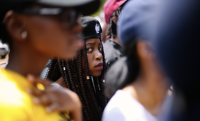 Stuart Hall’s ironic use of “the west and the rest” is very real in the fixation among South Africans with “us” and “Africa”. It was encouraging that a sense of South Africa’s inextricable connectedness to the rest of the continent surfaced at moments in the FMF struggle. But the curiosity about and interest in African politics, literature, and academic knowledge still hasn’t really taken off, whether among students or established scholars.
Stuart Hall’s ironic use of “the west and the rest” is very real in the fixation among South Africans with “us” and “Africa”. It was encouraging that a sense of South Africa’s inextricable connectedness to the rest of the continent surfaced at moments in the FMF struggle. But the curiosity about and interest in African politics, literature, and academic knowledge still hasn’t really taken off, whether among students or established scholars.
Face to face
30.05.2022 | by Sean Jacobs
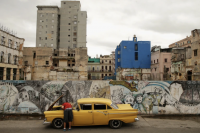 This particular building evoked the Lebanese capital for various reasons, not only its colonial-style architecture and Ottoman-esque windows but also the fact that one of its sections was fully collapsed – a common architectural repercussion in the formerly relentlessly celebrated “Paris of the Middle East”. Following its so-called “golden age” in the mid-20th century, Beirut had gone on to host, inter alia, a 15-year civil war (1975-90), brutal Israeli military assaults backed by the United States, vast post-war demolitions in the interest of historical amnesia and ever-savage elite enrichment, and the Beirut port explosion of August 2020.
This particular building evoked the Lebanese capital for various reasons, not only its colonial-style architecture and Ottoman-esque windows but also the fact that one of its sections was fully collapsed – a common architectural repercussion in the formerly relentlessly celebrated “Paris of the Middle East”. Following its so-called “golden age” in the mid-20th century, Beirut had gone on to host, inter alia, a 15-year civil war (1975-90), brutal Israeli military assaults backed by the United States, vast post-war demolitions in the interest of historical amnesia and ever-savage elite enrichment, and the Beirut port explosion of August 2020.
City
04.04.2022 | by Belen Fernandez
 In the wall text of the exhibition dedicated to African heritage “Appropriating objects and colonial fictions of Africa”, the curators state that “the current projects aim at the decolonization of collections through cooperation with partners from the societies of origin”. However, is this premise really being put into practice?
In the wall text of the exhibition dedicated to African heritage “Appropriating objects and colonial fictions of Africa”, the curators state that “the current projects aim at the decolonization of collections through cooperation with partners from the societies of origin”. However, is this premise really being put into practice?
I'll visit
30.03.2022 | by Ana Temudo
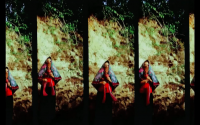 In the collective’s prolific and extensive filmography, the gesture of deconstructing the audiovisual and cinematic grammar is inseparable from the disarticulation of the hegemonic perceptive, cognitive, representative and scopic regimes. Los Ingrávidos’ work shifts indeed to a theoretical reflection, formalised in a correlative film praxis, focusing on the intersection between different domination categories related to the capitalist-colonial-patriarchal system. Their films aim, precisely, to disarticulate the perceptive-cognitive models and the audiovisual and cinematic forms resulting from domination categories.
In the collective’s prolific and extensive filmography, the gesture of deconstructing the audiovisual and cinematic grammar is inseparable from the disarticulation of the hegemonic perceptive, cognitive, representative and scopic regimes. Los Ingrávidos’ work shifts indeed to a theoretical reflection, formalised in a correlative film praxis, focusing on the intersection between different domination categories related to the capitalist-colonial-patriarchal system. Their films aim, precisely, to disarticulate the perceptive-cognitive models and the audiovisual and cinematic forms resulting from domination categories.
Games Without Borders
21.03.2022 | by Raquel Schefer
 I think we always have the responsibility of looking into the ghosts of these colonial dreams and taking the ideas further. For example, we must rethink what are artwork features and what exactly defines them? Institutions change, in a slow and tedious way, but it happens. If we also think about the thesis and how it is configurated, how free can we be about the aesthetic part of it? Now we can offer “decolonize art studies” as a course. All the reconfigurations are a very long process to be achieved. A very important thing I would like to highlight is that where you are you must do your work and contribution. We should try to influence others with our work, inspiring them and trying to change what we know is wrong.
I think we always have the responsibility of looking into the ghosts of these colonial dreams and taking the ideas further. For example, we must rethink what are artwork features and what exactly defines them? Institutions change, in a slow and tedious way, but it happens. If we also think about the thesis and how it is configurated, how free can we be about the aesthetic part of it? Now we can offer “decolonize art studies” as a course. All the reconfigurations are a very long process to be achieved. A very important thing I would like to highlight is that where you are you must do your work and contribution. We should try to influence others with our work, inspiring them and trying to change what we know is wrong.
Face to face
18.03.2022 | by Arimilde Soares
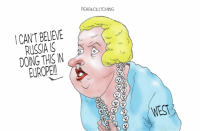 The conflict raging in Ukraine between Russian and Ukrainian Slavs, the latter with the support of a tribal coalition of nations across sub-Scandinavian Europe, has exposed much more than the fragility of peace on the disease-ravaged subcontinent. It has also revealed a mean streak of racist exceptionalism with which many Europeans, and people of European heritage, tend to regard themselves.
It has been impossible to miss the shock among Caucasian journalists covering the war, sparked by Russia’s invasion under the pretext of supporting ethnic allies in the eastern tribal enclaves of Donetsk and Luhansk, which it has recognised as independent states, at the idea that this could happen in Europe.
The conflict raging in Ukraine between Russian and Ukrainian Slavs, the latter with the support of a tribal coalition of nations across sub-Scandinavian Europe, has exposed much more than the fragility of peace on the disease-ravaged subcontinent. It has also revealed a mean streak of racist exceptionalism with which many Europeans, and people of European heritage, tend to regard themselves.
It has been impossible to miss the shock among Caucasian journalists covering the war, sparked by Russia’s invasion under the pretext of supporting ethnic allies in the eastern tribal enclaves of Donetsk and Luhansk, which it has recognised as independent states, at the idea that this could happen in Europe.
Games Without Borders
04.03.2022 | by Patrick Gathara
 My work has always been focused round connection. I’ve always wanted to tell stories that even though you know the audience and the subject might be different I would want the audience to look at the photo, the subjects, and each detail and for them to be able to see something similar.
Most people that look at my most recent project “MIXED” and probably don’t necessarily think of themselves as mixed, however if we really look back at history and ethnicity it’s clear that we are all mixed, we just haven’t identified it . We all came from Africa and our genetic disposition is remarkably similar. The only differences we notice are as a result of our ancestors colonising different parts of our planet. Effectively we’re all mixed as racial purity is a complete myth.
My work has always been focused round connection. I’ve always wanted to tell stories that even though you know the audience and the subject might be different I would want the audience to look at the photo, the subjects, and each detail and for them to be able to see something similar.
Most people that look at my most recent project “MIXED” and probably don’t necessarily think of themselves as mixed, however if we really look back at history and ethnicity it’s clear that we are all mixed, we just haven’t identified it . We all came from Africa and our genetic disposition is remarkably similar. The only differences we notice are as a result of our ancestors colonising different parts of our planet. Effectively we’re all mixed as racial purity is a complete myth.
Face to face
28.02.2022 | by Alícia Gaspar
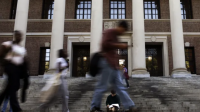 Students’ activism and social demand for more laws for people in need are some ways of changing the issue but are they enough? Can we fight against social stratification? This situation is an old one and it is deep-seated in society. People in power that belong to the upper classes want to remain that way. Is it possible the existence of an equal world with equal people, access, and values?
Students’ activism and social demand for more laws for people in need are some ways of changing the issue but are they enough? Can we fight against social stratification? This situation is an old one and it is deep-seated in society. People in power that belong to the upper classes want to remain that way. Is it possible the existence of an equal world with equal people, access, and values?
To read
17.02.2022 | by Arimilde Soares
 Gentrification is not always defined in these terms. Some cite cultural explanations, from the kind and number of amenities (like coffee shops, bike lanes, etc.) developed in an urban neighborhood to changing social norms around “lifestyle choices” (like not having children), defining gentrification as a result of individual consumer preferences. Or they might define it as the result of collective consumption patterns, which happens in arguments about “gay gentrification.” Some define gentrification as a process of white people moving to Black neighborhoods and pushing long-term Black residents out of major urban centers
Gentrification is not always defined in these terms. Some cite cultural explanations, from the kind and number of amenities (like coffee shops, bike lanes, etc.) developed in an urban neighborhood to changing social norms around “lifestyle choices” (like not having children), defining gentrification as a result of individual consumer preferences. Or they might define it as the result of collective consumption patterns, which happens in arguments about “gay gentrification.” Some define gentrification as a process of white people moving to Black neighborhoods and pushing long-term Black residents out of major urban centers
City
28.01.2022 | by Joe Tache
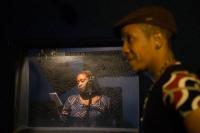 Notorious for blending the political and profane, denounced for its roots in Vodou, rabòday music is the defiant — and wildly popular — sound of a new, disaffected generation of Haitians. As the country prepares for long-awaited elections starting in August, stars of the genre have become unusually influential by turning public anxieties into dance-friendly anthems.
Notorious for blending the political and profane, denounced for its roots in Vodou, rabòday music is the defiant — and wildly popular — sound of a new, disaffected generation of Haitians. As the country prepares for long-awaited elections starting in August, stars of the genre have become unusually influential by turning public anxieties into dance-friendly anthems.
Stages
28.01.2022 | by Susana Ferreira
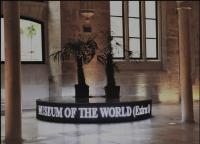 With this MEMOIRS project Newsletter, Nº 147, we conclude a journey started on May 5, 2018. To the
group of researchers of the project, to the dozens of external collaborators, to all the artists who
contributed with their images, to the producers and designers, the deep gratitude of the editors, who
are certain of two things: to have contributed to the sharing of a common good, knowledge, and to
have done so in the spirit of public service
With this MEMOIRS project Newsletter, Nº 147, we conclude a journey started on May 5, 2018. To the
group of researchers of the project, to the dozens of external collaborators, to all the artists who
contributed with their images, to the producers and designers, the deep gratitude of the editors, who
are certain of two things: to have contributed to the sharing of a common good, knowledge, and to
have done so in the spirit of public service
To read
17.01.2022 | by António Pinto Ribeiro
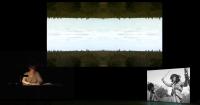 When our grandmother beheaded chicken, my brother begged: "don't kill the animals, let's go buy food at the supermarket". When did this happen? Ignoring the death of other beings in order to live. Wishing we didn't know about the destruction around our bubble. Was it when our parents moved from the countryside to the city? Was it when our thumb started to touch the screen more often? Animals? Only pets. Jungles? Only urban ones. In our houses, we clean up everything that reminds us of the dust from where we came from. Little pigs go to school, cats wear boots, play the piano and speak French, crickets are our consciousness, Elsa is the name of a depression, Katrina of a hurricane, Bárbara of a storm. Savagery instead of a country. Elements of land and sea as resources. People as users. Identities as consumption objects. Consuming, consuming to stabilise this fucked up disruption.
When our grandmother beheaded chicken, my brother begged: "don't kill the animals, let's go buy food at the supermarket". When did this happen? Ignoring the death of other beings in order to live. Wishing we didn't know about the destruction around our bubble. Was it when our parents moved from the countryside to the city? Was it when our thumb started to touch the screen more often? Animals? Only pets. Jungles? Only urban ones. In our houses, we clean up everything that reminds us of the dust from where we came from. Little pigs go to school, cats wear boots, play the piano and speak French, crickets are our consciousness, Elsa is the name of a depression, Katrina of a hurricane, Bárbara of a storm. Savagery instead of a country. Elements of land and sea as resources. People as users. Identities as consumption objects. Consuming, consuming to stabilise this fucked up disruption.
Mukanda
07.01.2022 | by Marta Lança
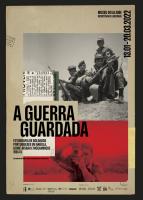 During their years at war, thousands of the young recruits sent to Angola, Guinea-Bissau and Mozambique took photos of what surrounded them: their comrades, barracks, landscapes, daily life, the civilian population, and the military apparatus. These images managed to evade the censorship of the regime, and were stored away or sent by mail as proof of their distant lives.
Some of these men built improvised darkrooms, others managed to access official ones. Many visited photography shops that flourished as a consequence of the demand generated by the war, and many bought and exchanged images. All this created the photographic archives of which we here present a part.
During their years at war, thousands of the young recruits sent to Angola, Guinea-Bissau and Mozambique took photos of what surrounded them: their comrades, barracks, landscapes, daily life, the civilian population, and the military apparatus. These images managed to evade the censorship of the regime, and were stored away or sent by mail as proof of their distant lives.
Some of these men built improvised darkrooms, others managed to access official ones. Many visited photography shops that flourished as a consequence of the demand generated by the war, and many bought and exchanged images. All this created the photographic archives of which we here present a part.
I'll visit
05.01.2022 | by Inês Ponte and Maria José Lobo Antunes